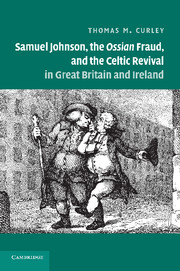Book contents
- Frontmatter
- Contents
- Prefatory acknowledgments
- 1 An introductory survey of scholarship on Ossian: why literary truth matters
- 2 James Macpherson's violation of literary truth
- 3 Johnson on truth, frauds, and folklore: in the company of Thomas Percy
- 4 Searching for truth in the Highlands: Macpherson throws down the gauntlet
- 5 Charles O'Conor and the Celtic Revival in Ireland
- 6 Johnson and the Irish: more opposition to Ossian
- 7 Johnson's last word on Ossian with William Shaw: a finale to controversy
- Appendix A A Reply to Mr. Clark's Answer
- Notes
- Bibliography
- Index
3 - Johnson on truth, frauds, and folklore: in the company of Thomas Percy
Published online by Cambridge University Press: 30 July 2009
- Frontmatter
- Contents
- Prefatory acknowledgments
- 1 An introductory survey of scholarship on Ossian: why literary truth matters
- 2 James Macpherson's violation of literary truth
- 3 Johnson on truth, frauds, and folklore: in the company of Thomas Percy
- 4 Searching for truth in the Highlands: Macpherson throws down the gauntlet
- 5 Charles O'Conor and the Celtic Revival in Ireland
- 6 Johnson and the Irish: more opposition to Ossian
- 7 Johnson's last word on Ossian with William Shaw: a finale to controversy
- Appendix A A Reply to Mr. Clark's Answer
- Notes
- Bibliography
- Index
Summary
Truth, whether in great or little matters, he held sacred.
Sir Joshua Reynolds, “On Johnson's Character”Famous for his fierce advocacy of integrity, Johnson demanded truth in life and literature. He possessed a Renaissance faith in the ability of reason and conscience to comprehend moral and religious principles of God's natural and revealed law. This older rationale for cognition he merged with the newer Enlightenment drive for empirical and inductive enquiry in all areas of endeavor, where fact-based knowledge led to larger generalizations about the human condition. Truth might be difficult to grasp as well as to bear, but it was prerequisite for all that was humanly worthwhile. One of the most moving statements in all his moral essays testifies fearlessly to the limitations of our ever fully apprehending the meaning of the objective world with anything like certainty:
Life is not the object of science: we see a little, a very little; and what is beyond we only can conjecture … The only thought, therefore, on which we can repose with comfort, is that which presents to us the care of Providence, whose eye takes in the whole of things, and under whose direction all involuntary errors will terminate in happiness …
(Adventurer 107)Profound skepticism was as deeply rooted in Johnson as any confidence-laden conviction about our duty to find the truth, and both attitudes point to a desperate human need for the divine.
- Type
- Chapter
- Information
- Publisher: Cambridge University PressPrint publication year: 2009



